When purchasing a vehicle, most buyers focus on the initial price tag, fuel efficiency, and maintenance costs. However, one crucial expense that often catches new car owners off guard is vehicle registration fees.
These costs vary dramatically not only from state to state but also depending on the specific vehicle you choose to register. Vehicle registration fees are calculated using various factors including the car’s value, weight, age, engine size, and emissions rating.
Some states employ a flat fee structure, while others use complex formulas that can result in registration costs ranging from under $50 to several thousand dollars annually. Understanding these differences can save you hundreds or even thousands of dollars over your vehicle’s lifetime.
The vehicles that typically incur the lowest registration fees share common characteristics: they’re usually older models with lower market values, smaller engines, lighter weight, and minimal luxury features.
Conversely, expensive registration fees are typically associated with high-value luxury vehicles, heavy trucks and SUVs, newer model years, and cars with large, powerful engines.
This comprehensive guide examines ten vehicles that represent both ends of the registration cost spectrum, helping you make informed decisions about your next vehicle purchase while considering the long-term financial implications beyond the showroom floor.
5 Cars With Cheap Registration Costs
These modest vehicles feature conservative valuations and efficient engines that result in minimal registration costs across all states, regardless of their fee calculation methods or environmental regulations.
Their reasonable MSRPs and practical positioning keep them in lower tax brackets for value-based registration systems, while their clean emissions profiles avoid the penalty fees imposed on gas-guzzlers.
From basic compact cars to sensible family sedans, these smart choices consistently generate the lowest possible DMV expenses without sacrificing reliability, comfort, or essential features.
Owners appreciate the predictable, minimal registration costs that remain affordable year after year, with many reporting annual fees under $100 even in states known for expensive vehicle taxation.
1. Honda Civic (2010-2015 Models)
The Honda Civic stands as one of the most registration-friendly vehicles across virtually every state in America, making it an exceptional choice for budget-conscious drivers who want to minimize their annual vehicle expenses.
The 2010-2015 model years represent a sweet spot where depreciation has significantly reduced the vehicle’s assessed value while maintaining the reliability and efficiency that Honda is renowned for.
In states that calculate registration fees based on vehicle value, such as Colorado, Georgia, and Virginia, these Civic models typically register for between $45-85 annually.
The depreciation curve works in favor of owners, as a 2012 Honda Civic that originally sold for $18,000 now has a book value around $8,000-10,000, dramatically reducing value-based registration calculations.
States like Florida and Texas, which use flat fee structures, charge even less, with registration costs often falling between $50-75 regardless of the vehicle’s original price.
The Civic’s lightweight construction, typically weighing between 2,600-2,800 pounds, also benefits owners in states that factor vehicle weight into registration calculations.
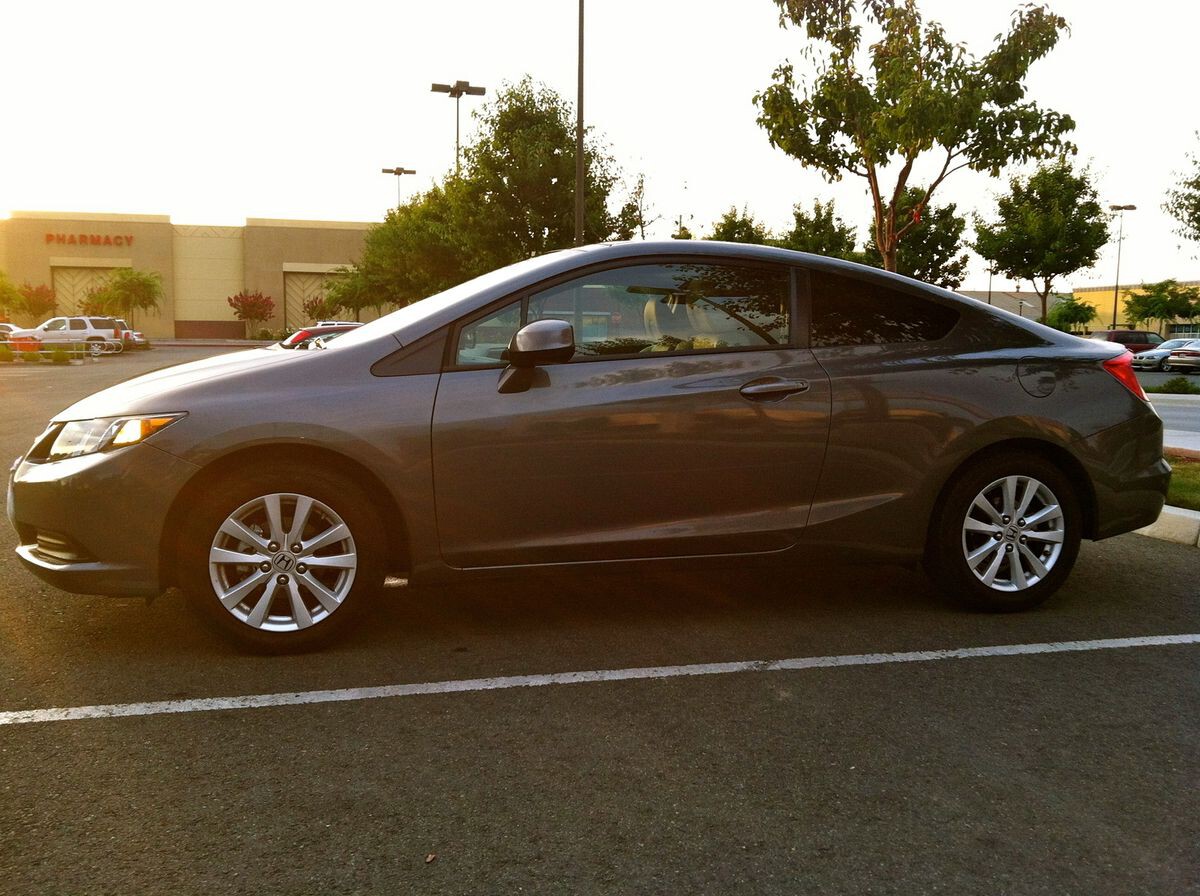
States like Oregon and Nevada consider weight as a primary factor, and the Civic’s relatively light frame keeps costs minimal compared to heavier sedans or SUVs.
Additionally, the Civic’s smaller engine options, ranging from 1.8L to 2.0L four-cylinder engines, result in lower fees in states that consider engine displacement.
From an emissions standpoint, Honda Civics from this era meet or exceed federal emissions standards and often qualify for reduced registration fees in environmentally conscious states like California and Washington.
The vehicle’s excellent fuel economy ratings, typically achieving 28-36 mpg combined, can qualify owners for additional discounts or reduced fees in states offering incentives for fuel-efficient vehicles.
Insurance costs complement the low registration fees, as Civics are among the least expensive vehicles to insure due to their safety ratings, low theft rates, and affordable repair costs.
This creates a comprehensive low-cost ownership experience that extends well beyond registration. The combination of reliable mechanical components, readily available parts, and straightforward maintenance requirements means that civic owners can expect minimal unexpected expenses throughout their ownership period.
2. Toyota Corolla (2009-2014 Models)
The Toyota Corolla from the 2009-2014 generation represents another exceptional choice for minimizing registration costs while maximizing long-term value and reliability.
These model years have reached the optimal depreciation point where their market values have stabilized at relatively low levels, typically ranging from $7,000-12,000, depending on mileage and condition, which directly translates to reduced registration fees in value-based calculation states.
In states like South Carolina, Arizona, and Montana, where registration fees correlate with vehicle value, Corolla owners typically pay between $40-80 annually.
The vehicle’s reputation for longevity means that even higher-mileage examples retain their reliability while commanding lower market values, creating an ideal scenario for registration cost minimization.
States employing flat fee structures, including Illinois and Michigan, typically charge Corolla owners between $55-90 annually, representing some of the lowest costs in their respective fee brackets.
The Corolla’s engineering emphasizes efficiency and simplicity, resulting in a curb weight of approximately 2,600-2,900 pounds, which benefits owners in weight-based calculation states.
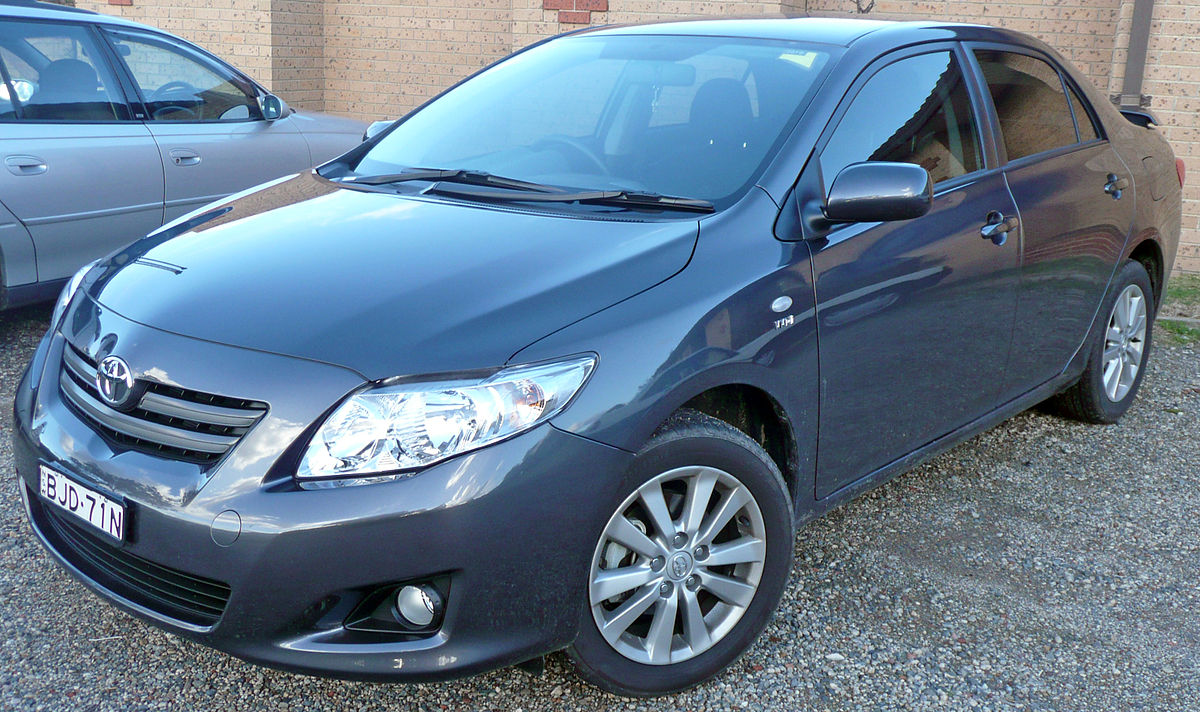
The vehicle’s 1.8L four-cylinder engine, standard across most trim levels during this generation, produces modest power outputs that keep engine displacement-based fees minimal.
This engine configuration strikes an excellent balance between adequate performance for daily driving and minimal registration cost impact. Toyota’s commitment to environmental responsibility during this era resulted in Corollas that not only meet but often exceed emissions requirements, qualifying for reduced fees or exemptions in states with emissions-based registration calculations.
The vehicle’s fuel economy ratings, typically achieving 26-34 mpg combined, depending on transmission choice, can qualify owners for additional incentives in states promoting fuel efficiency through reduced registration costs.
The Corolla’s design philosophy prioritizes practicality and cost-effectiveness, extending beyond registration savings to encompass insurance, maintenance, and repair costs.
Insurance companies consistently rate these Corollas favorably due to their safety features, low performance profile that appeals to responsible drivers, and the abundance of affordable replacement parts.
This comprehensive approach to cost-effectiveness makes the Corolla an intelligent choice for buyers prioritizing total ownership costs rather than just initial purchase price.
3. Nissan Versa (2012-2016 Models)
The Nissan Versa from the 2012-2016 model years represents one of the most economical choices for registration costs, primarily due to its position as an entry-level vehicle with significant depreciation and lightweight construction.
These model years have experienced substantial depreciation, with current market values typically ranging from $6,000-9,500, placing them in the lowest registration fee brackets across most states that calculate fees based on vehicle value.
In value-based registration states such as Colorado, Minnesota, and Rhode Island, Versa owners typically encounter annual registration fees ranging from $35-70, representing some of the lowest costs available for reliable transportation.
The vehicle’s original positioning as an affordable, no-frills transportation solution means that even when new, it didn’t command premium prices, and current depreciated values make it exceptionally registration-friendly.
Flat fee states like Pennsylvania and Ohio typically charge Versa owners between $45-75 annually, maintaining the cost-effectiveness across different fee calculation methods.
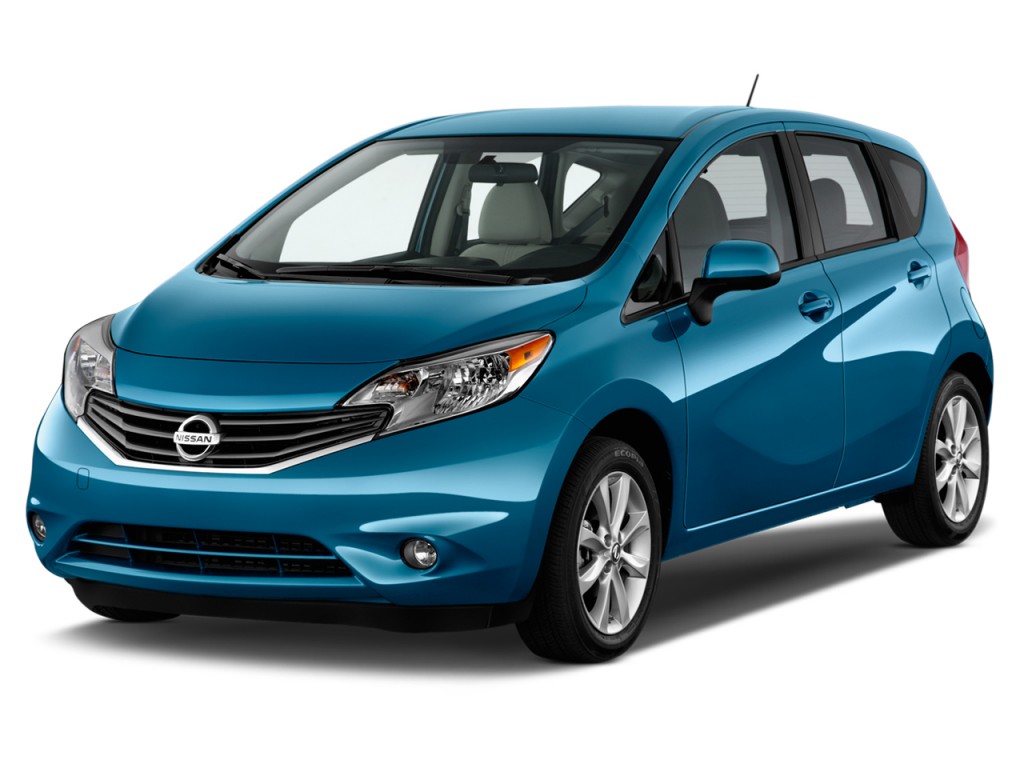
The Versa’s lightweight construction, with most models weighing between 2,400-2,600 pounds, provides significant advantages in states that incorporate vehicle weight into registration calculations.
This lighter weight class often places the Versa in lower fee brackets compared to heavier compact cars, let alone mid-size or full-size vehicles. The standard 1.6L four-cylinder engine further contributes to low registration costs in states considering engine displacement, as this smaller engine size typically falls into the most affordable fee categories.
From an environmental perspective, the Versa’s fuel efficiency ratings of 27-31 mpg combined help qualify for reduced registration fees in states offering incentives for fuel-efficient vehicles.
The vehicle’s compliance with federal emissions standards and relatively low emissions output can result in additional savings in environmentally focused states like California, Vermont, and Oregon.
While the Versa may not offer the premium feel or advanced features found in more expensive vehicles, its straightforward design and reliable mechanical components provide dependable transportation at minimal ongoing costs.
Insurance rates remain low due to the vehicle’s modest performance characteristics and affordable replacement costs, while maintenance expenses stay reasonable thanks to widely available parts and straightforward servicing requirements.
4. Ford Focus (2008-2013 Models)
The Ford Focus from the 2008-2013 generation offers exceptional value for registration cost-conscious buyers, particularly due to the significant depreciation these models have experienced and their efficient design characteristics.
Current market values for these Focus models typically range from $5,500-9,000, placing them squarely in the lowest registration fee brackets for states that calculate costs based on vehicle value.
In states like Alabama, Kansas, and North Dakota, where vehicle value significantly influences registration costs, Focus owners typically pay between $40-75 annually.
The substantial depreciation these models have experienced works strongly in favor of current owners, as vehicles that originally sold for $16,000-20,000 now register at much lower assessed values.
States utilizing flat fee structures, including Wisconsin and Iowa, typically charge Focus owners between $50-85 annually, maintaining affordability across different calculation methods.
The Focus’s design emphasizes fuel efficiency and practical transportation, resulting in a curb weight of approximately 2,500-2,800 pounds depending on configuration.
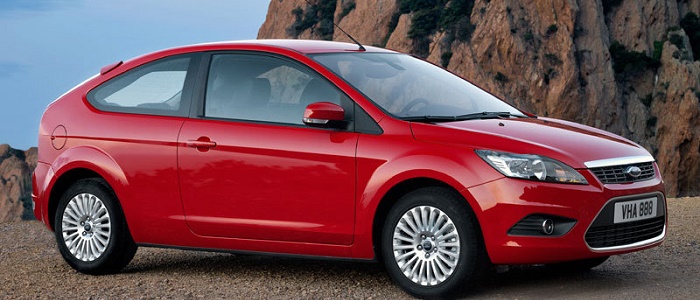
This weight places the Focus favorably in states that factor vehicle weight into registration calculations, often qualifying for lower fee brackets compared to heavier competitors.
The standard engine options, primarily 2.0L four-cylinder units with some 2.3L variants, remain in relatively low displacement categories that minimize engine-based registration fees.
Ford’s engineering during this generation focused heavily on fuel economy improvements, with most Focus models achieving 24-35 mpg combined depending on transmission and driving conditions.
This efficiency can qualify owners for reduced registration fees in states offering incentives for fuel-efficient vehicles, while the vehicle’s emissions compliance ensures minimal environmental-based fee additions.
The Focus’s position in the compact car segment means that insurance costs remain reasonable, complementing the low registration expenses. The vehicle’s safety ratings and moderate performance characteristics appeal to insurance companies, while the availability of affordable parts and straightforward maintenance procedures keep long-term ownership costs manageable.
This combination of factors makes the Focus an intelligent choice for buyers seeking to minimize total transportation costs while maintaining reliable, comfortable daily transportation.
Also Read: 5 Cars That Have Clean Titles at 200K Miles and 5 That Hide Lemon History
5. Chevrolet Cobalt (2005-2010 Models)
The Chevrolet Cobalt, despite being discontinued after 2010, represents one of the most cost-effective choices for registration fees due to its current low market values and efficient design characteristics.
These vehicles have experienced significant depreciation, with current market values typically ranging from $4,000-7,500, placing them in the absolute lowest registration fee categories across most states.
In value-based registration states such as Delaware, Mississippi, and Wyoming, Cobalt owners typically encounter annual registration fees ranging from $30-65, representing exceptional value for reliable transportation.
The vehicle’s discontinued status has accelerated depreciation beyond typical curves, meaning that even well-maintained examples with reasonable mileage command relatively low market values that directly translate to minimal registration costs.
States with flat fee structures, including Indiana and Tennessee, typically charge Cobalt owners between $40-70 annually. The Cobalt’s lightweight construction, with most models weighing between 2,700-2,900 pounds, provides advantages in weight-based calculation states.
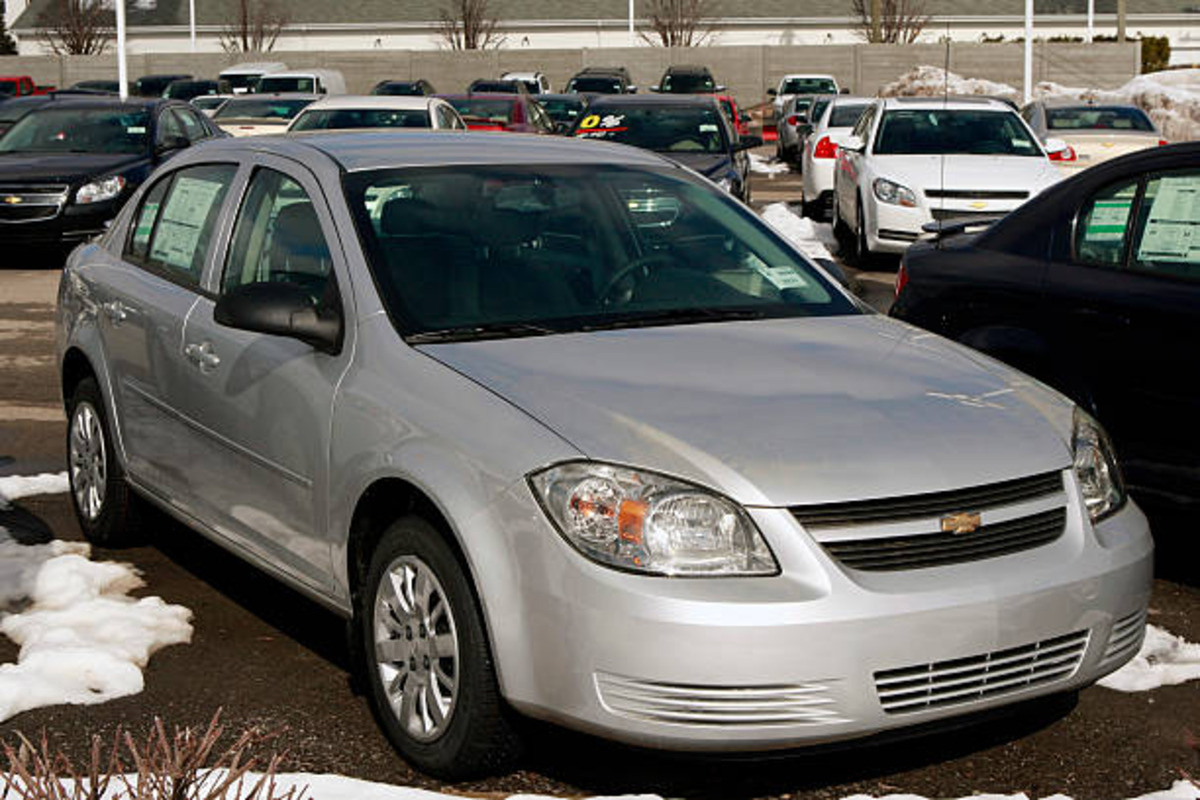
The vehicle’s compact dimensions and efficient packaging contribute to this favorable weight class, often placing it in lower fee brackets compared to contemporary compact cars.
Engine options, primarily consisting of 2.2L and 2.4L four-cylinder units, fall into moderate displacement categories that avoid premium engine-based registration fees while providing adequate performance for daily driving needs.
Fuel efficiency ratings for the Cobalt typically range from 22-32 mpg combined, depending on engine choice and transmission configuration. While not class-leading by current standards, these efficiency numbers can still qualify for reduced registration fees in states offering incentives for fuel-efficient vehicles.
The vehicle’s emissions compliance with federal standards of its era helps minimize environmental-based fee additions. Despite its discontinued status, the Cobalt offers practical advantages for cost-conscious buyers beyond just registration savings.
Insurance rates remain low due to the vehicle’s modest performance profile and affordable replacement costs. Parts availability, while not as extensive as current production vehicles, remains adequate for maintenance needs, and the straightforward mechanical design keeps service costs reasonable.
5 Cars That Cost a Fortune to Register
These high-value vehicles trigger maximum registration penalties in states that calculate fees based on purchase price, weight, or emissions output creating ongoing expenses that rival monthly payments.
Their luxury positioning and premium MSRPs push them into the highest tax brackets for value-based systems, while their powerful engines often incur additional gas-guzzler penalties that compound the financial impact.
From exotic sports cars to premium SUVs, these expensive choices generate shocking annual registration bills that many owners discover only after purchase, creating unwelcome budget surprises.
What begins as a one-time purchase decision transforms into a recurring financial burden, with some owners reporting annual registration costs exceeding $1,000 in states with aggressive luxury vehicle taxation.
1. Tesla Model S Plaid (2021-Present)
The Tesla Model S Plaid represents the pinnacle of electric vehicle performance and luxury, but this distinction comes with substantial registration costs that can shock unsuspecting owners across virtually every state.
With a current market value ranging from $90,000-130,000 depending on configuration and model year, the Model S Plaid consistently falls into the highest registration fee brackets in states that calculate costs based on vehicle value.
In high-cost registration states like Colorado, where luxury vehicle registration can exceed $2,000 annually, Model S Plaid owners face some of the steepest costs in the nation.
Colorado’s specific formula considers both vehicle value and weight, and the Model S Plaid’s substantial 4,800-pound curb weight compounds the already high value-based calculations.
States like Virginia and Georgia, which also employ value-based systems, typically charge Model S Plaid owners between $1,200-2,500 annually, representing a significant ongoing expense that many buyers don’t anticipate.
Even in states with supposedly “flat” fee structures, the Model S Plaid often triggers additional charges due to its weight classification and luxury status.
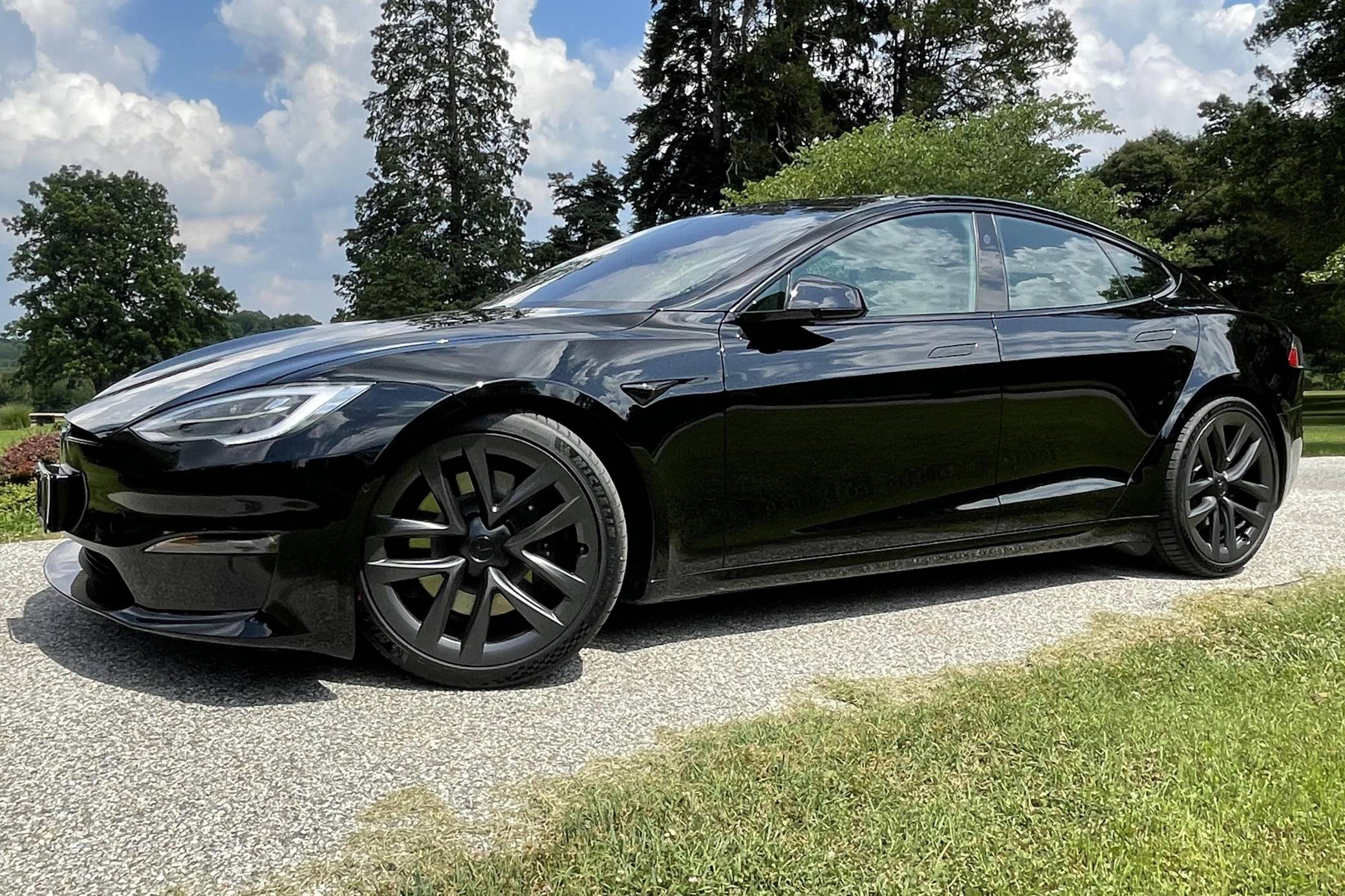
States like Texas and Florida, generally considered registration-friendly, still impose higher fees for electric vehicles over certain weight thresholds, with Model S Plaid owners typically paying $300-600 annually.
The vehicle’s advanced technology systems and luxury appointments can trigger additional fees in states that classify vehicles based on equipment levels or luxury status.
The Model S Plaid’s tri-motor all-wheel-drive system, while not subject to traditional engine displacement fees, often falls under special electric vehicle registration categories that can include additional infrastructure fees, road usage charges, or luxury vehicle surcharges.
Some states impose supplemental fees on electric vehicles to compensate for lost gasoline tax revenue, with high-value EVs like the Model S Plaid often subject to the highest rates in these fee structures.
Insurance costs compound the registration expense burden, as the Model S Plaid’s high value, expensive repair costs, and advanced technology systems result in premium insurance rates.
The combination of high registration fees, expensive insurance, and potential special assessments creates a substantial ongoing cost structure that can easily exceed $3,000-5,000 annually in total vehicle-related fees, not including maintenance or depreciation considerations.
2. Porsche 911 Turbo S (2019-Present)
The Porsche 911 Turbo S represents automotive engineering excellence, but owners face substantial registration costs that reflect both the vehicle’s premium market position and performance capabilities.
With current market values ranging from $180,000-250,000 depending on model year and configuration, the 911 Turbo S consistently triggers the highest registration fee brackets across states that calculate costs based on vehicle value.
In states like Montana and South Dakota, where luxury vehicle registration can involve complex calculations incorporating value, performance metrics, and luxury classifications, 911 Turbo S owners often face annual registration costs exceeding $3,000.
These states consider not only the vehicle’s substantial market value but also its high-performance classification, twin-turbocharged engine specifications, and luxury appointment levels.
Value-based calculation states such as Colorado, Minnesota, and Virginia typically charge 911 Turbo S owners between $2,000-4,500 annually, creating a substantial ongoing expense that significantly impacts total ownership costs.
The 911 Turbo S’s 3.8-liter twin-turbocharged flat-six engine, producing over 640 horsepower, often triggers additional performance-based fees in states that consider engine specifications or power output in their registration calculations.

The vehicle’s curb weight of approximately 3,600 pounds, while not excessive by luxury car standards, combined with its high value creates compound fee calculations that maximize registration costs.
States that factor multiple variables into registration calculations often see the 911 Turbo S reach fee caps or maximum brackets. Even in traditionally registration-friendly states with flat fee structures, the 911 Turbo S often faces additional charges due to luxury vehicle classifications, performance car categories, or special assessment fees.
States like Nevada and New Hampshire, generally considered low-cost registration states, still impose additional fees for high-value sports cars, with 911 Turbo S owners typically paying $400-800 annually beyond standard registration costs.
The vehicle’s advanced technology systems, including sophisticated all-wheel-drive systems, active aerodynamics, and premium interior appointments, can trigger additional fees in states that classify vehicles based on luxury equipment levels.
Some jurisdictions impose supplemental charges for vehicles exceeding certain luxury thresholds, with the 911 Turbo S consistently falling into the highest categories.
Insurance costs further compound the expense burden, as comprehensive coverage for a vehicle of this value and performance capability typically costs $3,000-6,000 annually, creating a total ongoing cost structure that can easily exceed $5,000-8,000 annually in registration and insurance fees alone.
3. Mercedes-AMG G63 (2018-Present)
The Mercedes-AMG G63 combines luxury SUV practicality with high-performance capabilities, but this unique positioning results in some of the highest registration costs in the automotive landscape.
With current market values ranging from $150,000-200,000 depending on model year and configuration, the G63 consistently falls into premium registration fee brackets while also triggering weight-based penalty fees due to its substantial 5,800-pound curb weight.
In states that employ complex registration calculations considering both value and weight, such as Colorado and Oregon, G63 owners face annual registration costs that can exceed $3,500.
The vehicle’s combination of luxury car valuation and heavy truck weight classification creates a perfect storm for maximum fee calculations. States like California and Washington, which factor environmental considerations into registration costs, may impose additional fees on the G63’s twin-turbocharged V8 engine and relatively modest fuel economy ratings of 13-16 mpg combined.
The G63’s 4.0-liter twin-turbocharged V8 engine, producing 577 horsepower, often triggers additional performance-based fees in states that consider engine specifications or emissions output.

The vehicle’s substantial weight places it in commercial vehicle categories in some jurisdictions, subjecting it to higher fee structures typically reserved for commercial trucks and heavy-duty vehicles.
This classification can result in registration costs that exceed those of similarly priced but lighter luxury vehicles. Even in states with relatively straightforward fee structures, the G63’s luxury SUV classification often results in additional charges beyond standard passenger vehicle rates.
States like Texas and Florida, generally considered registration-friendly, still impose higher fees for luxury SUVs exceeding certain weight or value thresholds, with G63 owners typically paying $500-1,200 annually beyond standard rates.
The vehicle’s off-road capability classifications can trigger additional fees in states that differentiate between standard SUVs and specialized off-road vehicles.
The G63’s advanced luxury appointments, including premium leather interiors, sophisticated infotainment systems, and extensive driver assistance technologies, can result in additional luxury equipment fees in jurisdictions that assess such charges.
Some states impose graduated fee structures based on luxury equipment levels, with the G63’s extensive feature list consistently placing it in the highest categories.
Insurance costs compound these expenses significantly, as comprehensive coverage for a vehicle combining high value, performance capability, and theft desirability typically costs $4,000-7,000 annually, creating total ongoing costs that can easily exceed $6,000-10,000 annually in registration and insurance fees combined.
4. BMW M8 Competition (2020-Present)
The BMW M8 Competition represents the pinnacle of BMW’s performance luxury coupe lineup, but ownership comes with substantial registration costs that reflect both its premium positioning and high-performance capabilities.
With current market values ranging from $130,000-180,000 depending on configuration and model year, the M8 Competition consistently triggers the highest registration fee brackets in value-based calculation states while also facing additional performance vehicle surcharges.
In states employing comprehensive registration calculations that consider value, performance, and luxury classifications, such as Virginia and Delaware, M8 Competition owners often face annual registration costs exceeding $2,500.
The vehicle’s twin-turbocharged 4.4-liter V8 engine, producing 617 horsepower, triggers performance-based fee additions in states that consider engine specifications or power output in their calculations.
The combination of high market value and extreme performance capabilities creates compound fee structures that maximize registration costs.
The M8 Competition’s sophisticated all-wheel-drive system, advanced suspension technologies, and extensive carbon fiber components contribute to both its high market value and complex fee calculations in states that assess charges based on luxury equipment levels.

States like Colorado and Minnesota, which employ multi-factor registration calculations, typically charge M8 Competition owners between $1,800-3,200 annually, representing substantial ongoing expenses that significantly impact total ownership costs.
Even in traditionally registration-friendly states, the M8 Competition often faces additional charges due to luxury sports car classifications or high-performance vehicle categories.
The vehicle’s curb weight of approximately 4,200 pounds, while substantial, is often overshadowed by its high value in registration calculations, but can contribute to compound fee structures in states considering multiple factors.
States like Arizona and Utah, generally considered moderate-cost registration jurisdictions, still impose additional fees for high-value performance cars, with M8 Competition owners typically paying $300-700 annually beyond standard registration costs.
The vehicle’s advanced technology systems, including sophisticated driver assistance features, premium audio systems, and high-end interior appointments, can trigger additional luxury equipment fees in states that assess such charges.
The M8 Competition’s fuel economy ratings of approximately 15-21 mpg combined may subject it to additional fees in environmentally focused states that penalize lower-efficiency vehicles.
Insurance costs significantly compound the registration expense burden, as comprehensive coverage for a high-value, high-performance vehicle with expensive repair costs typically ranges from $3,500-6,500 annually, creating total ongoing costs that can easily exceed $5,000-9,000 annually in registration and insurance fees alone.
5. Cadillac Escalade ESV (2021-Present)
The Cadillac Escalade ESV represents American luxury SUV excellence in its largest and most luxurious form, but ownership comes with registration costs that reflect both its premium market position and substantial size.
With current market values ranging from $85,000-120,000 depending on configuration and trim level, the Escalade ESV consistently falls into high registration fee brackets while also triggering additional charges due to its massive 6,200-pound curb weight and luxury classification.
In states that calculate registration fees based on both vehicle value and weight, the Escalade ESV creates a perfect storm for maximum fee calculations.
States like Oregon and Colorado, which employ complex multi-factor fee structures, often charge Escalade ESV owners between $1,500-2,800 annually.
The vehicle’s substantial weight places it in heavy vehicle categories that typically command higher fees, while its luxury appointments and high market value trigger additional premium vehicle surcharges.
The Escalade ESV’s 6.2-liter naturally aspirated V8 engine, while powerful and refined, contributes to registration cost increases in states that factor engine displacement or emissions output into their calculations.
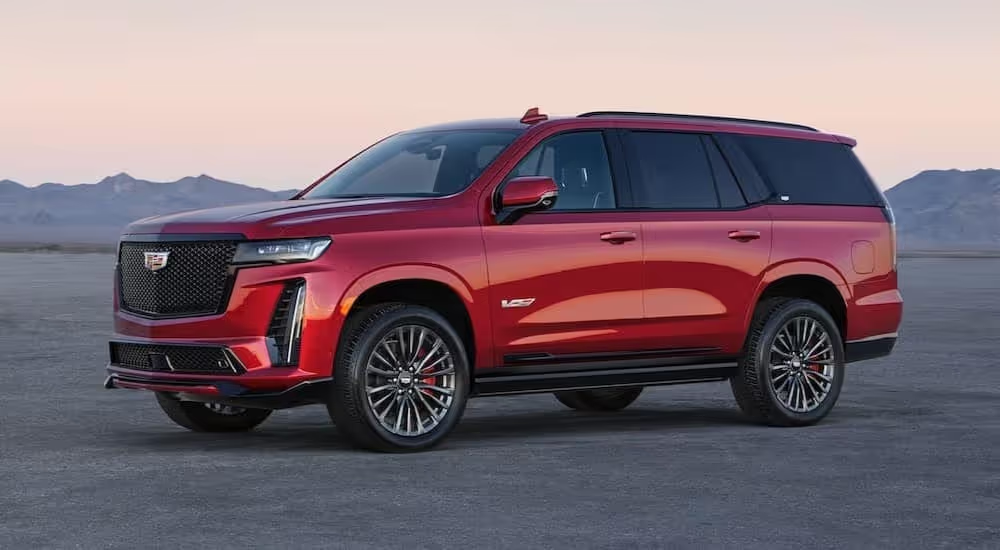
The vehicle’s fuel economy ratings of approximately 14-19 mpg combined may subject it to additional fees in environmentally conscious states that penalize lower-efficiency vehicles.
States like California and Washington, which emphasize environmental considerations in their fee structures, may impose supplemental charges on large, fuel-thirsty luxury vehicles.
Even in states with relatively straightforward registration fee structures, the Escalade ESV’s classification as a luxury full-size SUV often results in additional charges beyond standard passenger vehicle rates.
The vehicle’s extensive luxury appointments, including premium leather interiors, advanced infotainment systems, and sophisticated driver assistance technologies, can trigger luxury equipment fees in states that assess such charges.
States like Illinois and Michigan, generally considered moderate-cost registration jurisdictions, still impose higher fees for luxury SUVs exceeding certain weight or value thresholds.
The Escalade ESV’s commercial vehicle weight classification in some jurisdictions can subject it to commercial registration requirements or fees, significantly increasing costs beyond standard passenger vehicle rates.
Some states differentiate between standard SUVs and large luxury SUVs, with the Escalade ESV’s dimensions and weight often placing it in specialized categories that command premium fees.
Insurance costs compound these substantial registration expenses, as comprehensive coverage for a high-value, large luxury SUV with expensive repair costs and higher theft rates typically ranges from $2,500-5,000 annually, creating total ongoing costs that can easily exceed $4,000-7,500 annually in registration and insurance fees combined.
Also Read: 5 Vehicles That Qualify for Insurance Discounts and 5 That Cost More Each Year

